David Sawler pastors and directs youth centres in Cape Breton – Glace Bay. His heart is for the community. He sees the poverty, addictions and trauma during this period of COVID. How can the church become community centred and at the centre of the community?
“We work in a demographic that may be different than a lot of people work in. . . I think it’s about 40% of our community lives below the poverty line. The amount of addiction here in Cape Breton is actually incredibly high. The Canadian government put out a movie in 2006 called cotton land, which was you know, the story about how oxy cotton has affected communities around well around the world, but in Canada, and so it was actually filmed here in Glace Bay.”
“Oh, so the town I live in is where at this point one of the communities in Canada that was affected the most by drug use. So we have, right in our city, we have two of the towns that have the highest amount of opiate related deaths per capita, like our population isn’t huge here. Per capita, we’re the highest. We give out about 400% more needles for safe injection here in Cape Breton in the mainland of Nova Scotia, we have like the highest amount of kids who self harm, here in Cape Breton. The stats are staggering.”
“And so we primarily we came to plant a church, or churches, in communities that actually have real trouble supporting a church. Because the people we work with, . . . This community has a really high percentage, around 40%, who can’t afford the basics of life. . . .The poverty and addiction issues have been just tough. So that’s a little bit about the where we live, and there wasn’t a lot of churches here. We actually, when we moved here, we’ve found hardly any youth or young adults attending any church of any denomination.”
“This area used to be a steel town, Cape Breton was known for coal mining. And so basically, it was within, you know, just a couple decades basically, we lost all the big industry. And the fisheries. of course, were really big here as well. And then with the collapse of the cod, and different things, it affected basically all the major things that were generating income in Cape Breton all died at the same time. So the population went down.”
“There’s definitely a level of hopelessness in people. And then, of course, . . . the younger generation, they’re in this cycle, like their parents really struggled. So now those kids are growing up in cycles of poverty and addiction. . . This worry about addiction, and the death that that’s brought was actually one of the biggest pains in the community.”
“Our spaces are going to be that for hundreds of people in our community, that we’re going to model what the kingdom of God looks like, and that we just create the spaces for the community to be. . . . Our main objective here is to continue to create, like community, transformation centers that our church would be the one who leads, like the entire community out of poverty and addiction. . . . We’re always praying, like, Let Your kingdom come on earth as it is in heaven. How would you know it was happening? And so some people say, well think, well, if you have better church services, well, that that’s actually awesome, if that’s what’s going on. But what I was thinking about my community I work in, what would it look like when the kingdom of God was at work, if it looked like freedom? People would walk in freedom, and people would walk in hope, and people would actually be set free.”
“We decided our buildings right from the being would be for the community that our church meets in . . I really think the philosophy of where that all came from is right out my window here. My neighbors that beside me. . . And when I think about our neighbors if we have the space, we think our space is for us, like God gave us space, that the center of our church is the pastors, it’s the elders, it’s the board. . . , Where(as) I think our philosophy was if we have this space, that the center of our space is going to be our neighbors, the broken, the impoverished, the people suffering from addiction, and people that are lost. So we decided that will always be the center of our space – not us. And that’s a totally different way of thinking about space.”
“I’m so sold on this as a small church pastor to think you can think community more than even a big church in a big city. Like it’s such a unique, there’s such unique possibility around the small church, in some of our rural and small counties, like it is incredible if you think about the impact that we can have. And so I think letting faith arise in you that God can do that whatever it is . . . What’s it going to look like if the kingdom of God is at work here? And then just run after that!”

